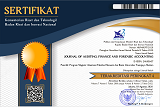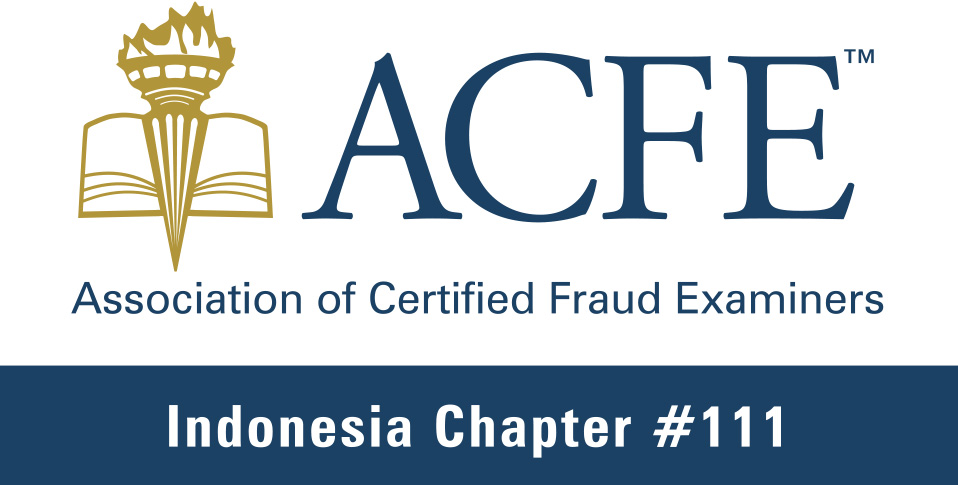Family Firms, Audit Fee, and Auditor Choice: Evidence From Indonesia
Abstract
Family firms in Indonesia have an important role in the Indonesian economy. However, agency problems might happen inside family firms where it will lead to conflict of interest and information asymmetry, along with the entrenchment effect where it leads firms to produce lower quality earnings report. Research from 305 firms in Indonesia shows that the agency problems and the entrenchment effect has not affected the family firms in Indonesia, reflected from the firm‟s decision making in their amount of audit fee and auditor choice. This study will contribute by providing an empirical evidence of the effect of family control on the audit fee and auditor choice in a developing country. The result shows that the type of firms has no correlation on the amount of audit fee paid to the auditor and both firms‟ demands the same level of audit quality where it is shown by their choices of audit firms, which is Big 4 audit firm or Non-Big 4 audit firm. In conclusion, the level of agency problems and entrenchment effect tends to be lower in the family firms of Indonesia.
Keywords
Full Text:
PDFReferences
Ahmed, K, and Goyal, M.K. (2005). A Comparative Study of Pricing of Audit Services in Emerging Economies. International Journal of Auditing, Vol. 9: 103-116.
Aksu, M., Onder, T., and Saatcioglu, K. (2007). Auditor selection, client firm characteristics, and corporate governance: Evidence from an emerging market. Working Paper. Sabanci University.
Ang, J., Cole, R., and Lin, J. (1999). Agency costs and ownership structure. Journal of finance, Vol. 55: 81-106.
Ashbaugh, H., LaFond, R., and Mayhew., B.W. (2003). Do non-audit services compromise auditor independence? Further evidence. The Accounting Review, Vol. 78 (3): 611.
Barontini, R. and Caprio, L. (2006). The effect of family control on firm value and performance: Evidence from Continental Europe. European Financial Management, Vol. 12(5): 689-723.
Beck, M., Mauldin, E. (2013). Who‟s really in charge? Audit committee versus CFO power and audit fees. Working paper, University of Missouri.
Boone, P.J., Khurana, K.I., and Raman, K.K. (2010). Do the Big 4 and the Second-tier firms provide audits of similar quality? Journal Accounting Public Policy, Vol. 29: 330-352.
Claessens, S., Djankov, S.L., and Larry, H.P. (2000). The separation of ownership and control in East Asian corporations. Working Paper. University of Cambridge.
Clement, V.C. and Palacio, J.R.S. (2015). How much does size matter in agri-food firms? Journal of Business Research, Vol. 68: 1589-1591.
CNN Indonesia. (2014, Februari 12. PwC: 95 Persen Perusahaan Indonesia adalah Bisnis Keluarga. (www.cnnindonesia.com).
Cohen, S. and Leventis, S. (2013). An empirical investigation of audit pricing in the public sector: The case of Greek LGOs. Financial Accountability and Management, Vol. 29(1): 74-98.
Collings, Steven. (2011). Interpretation and Application of International Standards on Auditing. United Kingdom: John Wiley and Sons, Ltd.
Darwin. (2012). Analisis perbedaan kualitas audit KAP Big 4 dan KAP second tier dinilai dari indepedensi auditor, manajemen laba, dan nili relevansi laba. Working Paper. Universitas Indonesia.
Francis, J., Khurana, I.K., and Pereira, R. (2003). The role of accounting and auditing in corporate governance and development in financial markets around the world. Asia-Pacific Journal of Accounting and Economics, Vol. 10(1): 1-30.
Gadhoum, Y. (1999). Potential effects of manager‟s entrenchment and shareholdings on competitiveness. European Journal of Operational Research, Vol. 118: 332349.
Hassan, Y.M. and Naser, K. (2013). Determinants of Audit Fees: Evidence from an Emerging Economy. International Business Research, Vol. 6: 8.
Ho, J.L., and Kang, F. (2013). Auditor choice and audit fees in family firms: evidence from the SandP 1500. Auditing: A Journal of Practice and Theory, Vol. 32(4): 7193.
Hoitash, R., Markelevich, A., and Barragato, C. A. (2007). Audit fees and audit quality. Managerial Auditing Journal, Vol. 22(8): 761-786.
Ikatan Akuntan Indonesia. 2013. Standar Akuntansi Keuangan Per Efektif 1 Januari 2013. Jakarta: Ikatan Akuntan Indonesia.
Institut Akuntan Publik Indonesia. (2008). Surat Keputusan No KEP.024/API/VII/2008 tentang Kebijakan Penentuan Fee Audit Institut Akuntan Publik Indonesia. 2013. Standar Audit (“SA”) 510 Perikatan Audit Tahun Pertama – Saldo Awal. Jakarta: Salemba Empat
Kabir, M. H., Sharma, D., Islam, M. A., and Salat, A. (2011). Big 4 auditor affiliation and accruals quality in Bangladesh. Managerial Auditing Journal, Vol. 26(2): 161-181.
Khan, A., Muttakin, M.B., and Siddiqui, J. (2015). Audit fees, auditor choice, and stakeholder influence: Evidence from a family firm dominated economy. The British Accounting Review, Vol. xxx: 1-17.
Lawrence, A., Minutti-Meza, K., and Zang, P. (2011). Can Big 4 versus Non-Big 4 differences in audit quality proxies be attributed to client characteristics? The Accounting Review, Vol. 86(1): 259-286.
Lee, H.L. and Lee, H. (2013). Do Big 4 audit firms improve the value relevance of earnings and equity? Managerial Auditing Journal, Vol. 28(7): 628-646.
Lin, Z. J. and Liu, M. (2009). The impact of corporate governance on auditor choice: Evidence from China. Journal of International Accounting, Auditing and Taxation, Vol. 18: 44-59.
Martinez, J.I., Stohr, B.S. and Quiroga, B.F. (2007). Family ownership and firm performance: Evidence from Public Companies in Chile. Family Business Review, Vol. 20(2): 83-94.
Parrino, R., Sias, R. W. and Starks, L.T. (2003). Voting with their feets: institutional ownership changes around forced CEO turnover. Journal of Financial Economics, Vol. 68: 3-46.
Raghunandan, K., and Rama, D. V. (2006). SOX Section 404 material weakness disclosures and audit fees. Auditing: A Journal of Practice and Theory, Vol. 25(1): 99-114.
Schulze, W., Lubatkin, M., Dina, R., and Buchholtz, A. (2001). Agency relationship in family firms: theory and evidence. Organization Science, Vol. 12(2): 99-116.
Scott, W.R. (2015). Accounting Theory, 7 edition. Pearson: Canada.
Shanker, M.C. and Astrachan, J.H. (1996). Myth and realities: family businesses‟ th contribution to the US economy – A framework for assessing family business statistics. Family Business Review, Vol. 9(2): 107-123.
Shaohua, H. (2010). Auditor Choice, Audit Fees, and Internal Governance in Family Firms. Working Paper. Lingnan University.
Shleifer, A., and Vishny, R. (1997). A survey of corporate governance. Journal of Finance, Vol. 52: 737-783.
Simunic, D.A. (1980). Assessing audit risk from errors and irregularities. Journal of Accounting Research, Vol. 28(supplement): 110-140.
Soyemi, K.A. (2014). Clients‟ / Auditors‟ attributes and external audit fees among listed non-financial companies in Nigeria. The Business and Management Review, Vol. 5(1): 131-140.
Sun, J. and Liu, G. (2011). Industry specialist auditors, outsider directors, and financial analyst. Journal Accounting Public Policy, Vol. 30: 367-382.
Thomsen, S. and Pederson, T. 2000. Ownership structure and economic performance in the largest European companies. Strategic Management Journal, Vol. 21(6): 689-705.
Ulhaq, A. and Leghari, M.K. 2015. Determinants of Audit Fee in Pakistan. Research Journal of Finance and Accounting, Vol. 6(9): 176-188.
Undang – Undang No 5 Tahun 2011 tentang Akuntan Publik.
Undang – Undang No 40 Tahun 2007 tentang Perseroan Terbatas.
Wang, D. 2006. Founding family ownership and earning quality. Journal of Accounting Research, Vol. 44(3): 619-656.
Wang, J.Y. 2014. Controlling shareholder entrenchment: Bonuses versus dividends. International Review of Economics and Finance, Vol. 32: 143-158. Wan-hussin, W. N. 2009. The impact of family-firm structure and board composition on corporate transparency: Evidence based on segment disclosures in Malaysia. The International Journal of Accounting, Vol. 44: 313-333.
Wall Street Journal (WSJ). 2003. Redefined by the SEC, „Audit fees‟ Get Murky. (www.wallstreetjournal.com)
Wall Street Journal (WSJ). 2011. U.K. auditors critized on Bank Crisis. (www.wallstreetjournal.com)
DOI: https://doi.org/10.21107/jaffa.v6i2.4936
Refbacks
- There are currently no refbacks.
Our Journal indexed by:
Our support tools using:



This work is licensed under a Creative Commons Attribution 4.0 International License.












